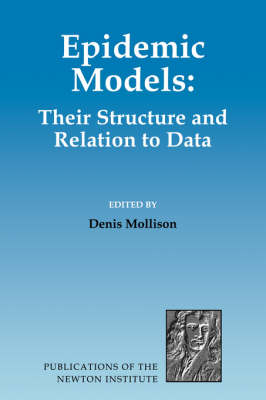
Epidemic Models
Cambridge University Press (Verlag)
978-0-521-47536-5 (ISBN)
The problems of understanding and controlling disease present a range of mathematical challenges, from broad theoretical issues to specific practical ones, making epidemiology one of the most vibrant branches of applied ecology. Progress in this field requires interdisciplinary collaboration; leading researchers with a wide range of mathematical expertise and close involvement in applied fields across the social, medical and biological sciences came together for a NATO Advanced Research Workshop marking the opening of a six-month programme on Epidemic Models at the Newton Institute in Cambridge in 1993. This volume is a result of that collaboration and surveys the state of epidemic modelling at the time in relation to basic aims such as understanding, prediction, and evaluation and implementation of control strategies.
Preface; Introduction; Part I. Conceptual Framework: 1. Some problems in the theory of infectious disease transmission and control Klaus Dietz; 2. The structure of epidemic models Denis Mollison; 3. Coupling methods in epidemic theory Frank Ball; 4. Collective epidemic processes: a general modelling approach to the final outcome of SIR epidemics Claude Lefévre and Philippe Picard; 5. The threshold concept in deterministic and stochastic models Ingemar Nasell; 6. How does transmission of infection depend on population size? Mart de Jong, Odo Diekmann and Hans Heesterbeek; 7. The legacy of Kermack and McKendrick Odo Diekmann, Hans Metz and Hans Heesterbeek; Part II. Spatial Models: 8. Incorporating spatial components into models of epidemic spread Andrew Cliff; 9. Velocities of epidemic spread Hans Metz and Frank van den Bosch; 10. Spatial epidemic models Richard Durrett; 11. A perturbation approach to nonlinear deterministic epidemic waves Henry Daniels; 12. Epidemic plant diseases: a stochastic model of leaf and stem lesion Lynne Billard, P. W. A. Dayananda and Zhen Zhao; Part III. Nonlinear Time and Space-Time Dynamics: 13. Detecting nonlinearity and chaos in epidemic data Stephen Ellner, Ronald Gallant and James Theiler; 14. Seasonality, demography and the dynamics of measles in developed countries Bryan Grenfell, Ben Bolker and Adam Kleczkowski; Part IV. Heterogeneity in Human Diseases: 15. Grouping in population models Simon Levin; 16. Core groups and R0s for subgroups in heterogeneous SIS and SI models John Jacquez, Carl Simon and James Koopman; 17. Data driven network models for the spread of disease Martina Morris; 18. The effect of antigenic diversity on endemic prevalence Sunetra Gupta, Katherine Trenholme, Martin Cox, Roy Anderson and Karen Day; Part V. Data Analysis: Estimation and Prediction: 19. Statistical challenges of epidemic data Niels Becker; 20. Primary components of epidemic models Andrew Cairns; 21. Estimation and prediction in tropical disease control: the example of onchocerciasis Hans Remme, Soumbey Alley and Anton Plaisier; 22. Some current trends in estimating vaccine efficacy Ira Longini, Elizabeth Halloran and Michael Haber; 23. Operational modelling of HIV/AIDS to assist public health control Norman Bailey; Appendix. Problem areas S. Ellner, O. Diekmann and N. Becker.
| Erscheint lt. Verlag | 13.7.1995 |
|---|---|
| Reihe/Serie | Publications of the Newton Institute |
| Zusatzinfo | 58 Line drawings, unspecified |
| Verlagsort | Cambridge |
| Sprache | englisch |
| Maße | 156 x 236 mm |
| Gewicht | 758 g |
| Themenwelt | Mathematik / Informatik ► Mathematik |
| Studium ► Querschnittsbereiche ► Epidemiologie / Med. Biometrie | |
| Naturwissenschaften ► Biologie ► Humanbiologie | |
| ISBN-10 | 0-521-47536-8 / 0521475368 |
| ISBN-13 | 978-0-521-47536-5 / 9780521475365 |
| Zustand | Neuware |
| Haben Sie eine Frage zum Produkt? |
aus dem Bereich


